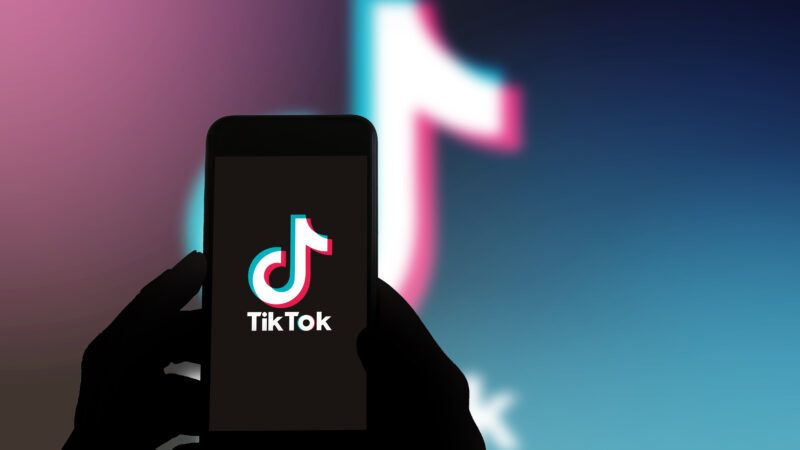Banning TikTok Would Give the Feds Way Too Much Power
"It's a disturbing gift of unprecedented authority to President Biden and the Surveillance State," said Sen. Rand Paul (R–Ky.).

TikTok might be in trouble: The U.S. House of Representatives approved legislation that would force ByteDance, the popular social media app's Chinese parent company, to sell it to a U.S.-based firm, or else it will be banned in the United States. The vote was 352–65. President Joe Biden has indicated that he will sign the legislation, so now it's just a matter of whether the Senate chooses to act.
The margin of the vote's passage and the bipartisan nature of the legislation might make people think that it's popular. This is certainly the framing that Republican proponents have adopted. Oren Cass, a former adviser to Sen. Mitt Romney (R–Utah) and a national conservative policy thinker, described libertarians who oppose the anti-TikTok legislation as "badly isolated" and "hurting their credibility in the conservative coalition."
1/ Can't be overstated how badly isolated libertarians are in this TikTok fight, and how much their kicking and screaming is hurting their credibility in the conservative coalition. ????
— Oren Cass (@oren_cass) March 12, 2024
On the other hand, three of the most important political and media figures on the right oppose the legislation. They are Tucker Carlson, Elon Musk, and…former President Donald Trump. Each has railed against the federal government's misguided efforts to police social media. Musk said the bill would result in "censorship and control." Carlson fretted that the feds could use this new authority to take similar action against X (formerly Twitter). Trump, who previously supported banning TikTok, is now worried it would hurt him with young people in the 2024 presidential election—definitely a flip-flop, but at least a directionally correct one.
The bill was also opposed by some of the most conservative members of the House (as well as some of the furthest left): Rep. Thomas Massie (R–Ky.), Rep. Matt Gaetz (R–Fla.), and Rep. Marjorie Taylor Greene (R–Ga.), but also Rep. Alexandria Ocasio-Cortez (D–N.Y.), Rep. Ayanna Pressley (D–Mass.), Rep. Ro Khanna (D–Calif.), and so on.
What this really shows is that the battle over TikTok is not a battle between libertarians and everyone else; on the contrary, it's a battle between various members of the bipartisan Washington, D.C., establishment who see direct government intervention as the answer to every problem and another group of people—libertarians included—who recognize that this power is likely to be abused.
Various dubious arguments have been deployed against TikTok, but the establishment's logic this time is that the app's Chinese owners are beholden to the Chinese Communist Party (CCP), and thus it poses a national security risk. To give this argument some credit, it is true that the CCP is an authoritarian menace; the Chinese government absolutely pressures TikTok to censor content about Tiananmen Square, the religious sect Falun Gong, and criticism of Chinese President Xi Jinping. Americans who get their news primarily from TikTok should keep this in mind.
Of course, the U.S. government has also pressured American tech companies to censor content on social media. Thanks to the Twitter Files, the Facebook Files, and other independent investigations, we know that multiple federal agencies—including the FBI, the Centers for Disease Control and Prevention, the Department of Homeland Security, and even the White House—instructed social media platforms to take down contrarian content relating to elections, Hunter Biden, COVID-19, and other subjects. When Joe Biden decided the companies had been insufficiently deferential to his pandemic-related dictates, he accused them of killing people and threatened to take action against them.
If Congress really wanted to do something about government censorship of content on social media, legislators could rein in the feds. They could reduce funding to agencies that engaged in wrongdoing, they could fire wrongdoers, and they could craft guidance for bureaucrats.
Instead, they are singularly focused on TikTok.
The legislation passed by the House would apply to any social media company that is designated as a "foreign adversary controlled application." U.S. law currently defines China, North Korea, Russia, and Iran as foreign adversaries. The bill further stipulates that an app is deemed to be controlled by a foreign adversary if it satisfies at least one of three different criteria: if it is headquartered in one of those countries, if one of those countries owns a 20 percent stake in it, or if the app is subject to "direction or control" by one of the foreign adversaries.
It is easy to see how this legislation creates a blueprint for taking future action against social media companies beyond just TikTok. In the wake of the 2016 election, Democratic lawmakers, mainstream media pundits, and national security advisers all accused Facebook of being complicit in Russia's various schemes to sow election-related discord online. Former Director of National Intelligence James Clapper said Russia was more responsible for Hillary Clinton's loss than Trump was. The thrust of this argument was that Facebook CEO Mark Zuckerberg had allowed his platform to be compromised by Russian misinformation.
It's true that if the TikTok bill were to become law today, the federal government would not likely take direct action against Facebook or X tomorrow. But the language in the bill—"direction and control"—is exceedingly slippery. It is not difficult to imagine a future where vengeful bureaucrats accuse a disfavored app of promoting contrarian views and punish it accordingly.
"The House ban of TikTok is not securing our nation," wrote Sen. Rand Paul (R–Ky.) on X. "It's a disturbing gift of unprecedented authority to President Biden and the Surveillance State that threatens the very core of American digital innovation and free expression."


Show Comments (72)